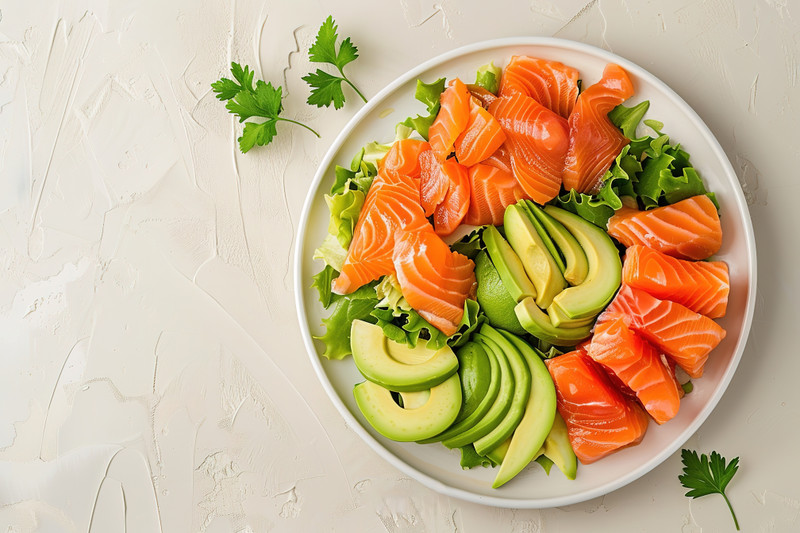For years, fats were often misunderstood and avoided due to their association with weight gain and health issues. However, not all fats are created equal. Healthy fats are essential for optimal body function, from maintaining energy levels to supporting brain health and reducing inflammation. Incorporating healthy fats into your diet is crucial for overall well-being and long-term health.
Why You Need Healthy Fats
Fats are one of the three macronutrients (along with carbohydrates and protein) that provide energy and support essential bodily functions. Here’s why healthy fats are vital:
Energy Source
Fats are a concentrated source of energy, providing 9 calories per gram—more than double the calories of carbohydrates or protein. They help fuel your body during prolonged physical activity and support your energy needs throughout the day.
Brain Health
About 60% of your brain is made up of fat, and healthy fats, such as omega-3 fatty acids, play a critical role in cognitive function and mental health. They help build and maintain cell membranes and protect brain cells from oxidative stress.
Hormone Production
Fats are necessary for producing and regulating hormones. They play a role in maintaining reproductive health, stress response, and metabolism.
Nutrient Absorption
Certain vitamins—A, D, E, and K—are fat-soluble, meaning they require fat for proper absorption. Including healthy fats in your meals ensures your body can utilize these essential nutrients.
Inflammation Reduction
Healthy fats, especially omega-3 fatty acids, have anti-inflammatory properties that help lower the risk of chronic conditions like heart disease, arthritis, and diabetes.
Heart Health
Monounsaturated and polyunsaturated fats, when consumed in moderation, can improve cholesterol levels, reduce blood pressure, and lower the risk of cardiovascular disease.
Types of Healthy Fats
Monounsaturated Fats
Monounsaturated fats are known for their heart-protective properties. They help lower bad cholesterol levels (LDL) while maintaining or improving good cholesterol levels (HDL).
Sources of Monounsaturated Fats:
- Olive oil
- Avocados
- Nuts (almonds, cashews, pecans)
- Seeds (pumpkin, sesame)
Polyunsaturated Fats
Polyunsaturated fats include omega-3 and omega-6 fatty acids, both of which are essential fats that your body cannot produce on its own.
Omega-3 Fatty Acids:
These fats are renowned for their anti-inflammatory benefits and are crucial for brain, heart, and eye health.
Sources of Omega-3s:
- Fatty fish (salmon, mackerel, sardines)
- Chia seeds
- Flaxseeds
- Walnuts
- Algal oil (plant-based omega-3 source)
Omega-6 Fatty Acids:
While omega-6 fats are essential, they should be consumed in balance with omega-3s to prevent inflammation.
Sources of Omega-6s:
- Sunflower oil
- Soybean oil
- Walnuts
- Pumpkin seeds
Saturated Fats
Saturated fats, when consumed in moderation, can also be part of a healthy diet. They provide energy and support hormone production.
Sources of Saturated Fats:
- Coconut oil
- Grass-fed butter or ghee
- Dark chocolate
- Whole milk
Unsaturated Fats vs. Trans Fats
While unsaturated fats (monounsaturated and polyunsaturated) are beneficial, trans fats are harmful and should be avoided. Trans fats are artificially created fats found in partially hydrogenated oils, which can increase bad cholesterol (LDL) and decrease good cholesterol (HDL), raising the risk of heart disease.
Foods Rich in Healthy Fats
Incorporating the following foods into your diet can help you enjoy the benefits of healthy fats while keeping your meals delicious and satisfying:
Avocados
A single avocado contains a generous amount of heart-healthy monounsaturated fats, as well as fiber, potassium, and vitamins.
Fatty Fish
Salmon, mackerel, and sardines are some of the best sources of omega-3 fatty acids, which reduce inflammation and support heart and brain health.
Nuts and Seeds
Nuts like almonds and walnuts, and seeds like flaxseeds and chia seeds, provide a combination of healthy fats, fiber, and protein.
Olive Oil
Extra virgin olive oil is a staple in the Mediterranean diet and is packed with monounsaturated fats and antioxidants.
Dark Chocolate
High-quality dark chocolate (at least 70% cocoa) contains healthy fats, antioxidants, and minerals like magnesium.
Eggs
Eggs, particularly the yolks, are a good source of saturated and unsaturated fats, along with essential nutrients like choline, which supports brain health.
Tips for Incorporating Healthy Fats
- Balance Your Plate: Pair healthy fats with protein and fiber-rich carbohydrates for balanced meals that keep you full and energized.
- Opt for Whole Foods: Choose whole, minimally processed sources of healthy fats whenever possible.
- Cook Smart: Use olive oil or avocado oil for cooking, as they have higher smoke points and retain nutrients.
- Moderation is Key: While healthy fats are essential, they are calorie-dense, so portion control is important.
A Note from Us
Healthy fats are a vital component of a well-rounded diet, supporting everything from energy production to heart and brain health. By choosing nutrient-rich sources of fats like avocados, nuts, seeds, and fatty fish, you can enjoy their many benefits while keeping your meals flavorful and satisfying.

